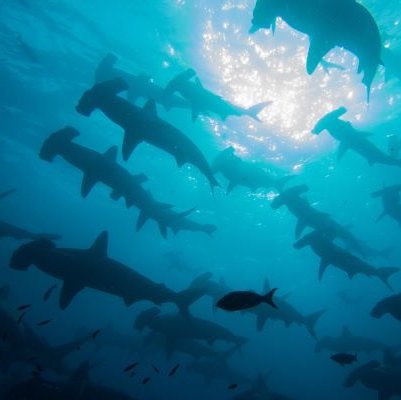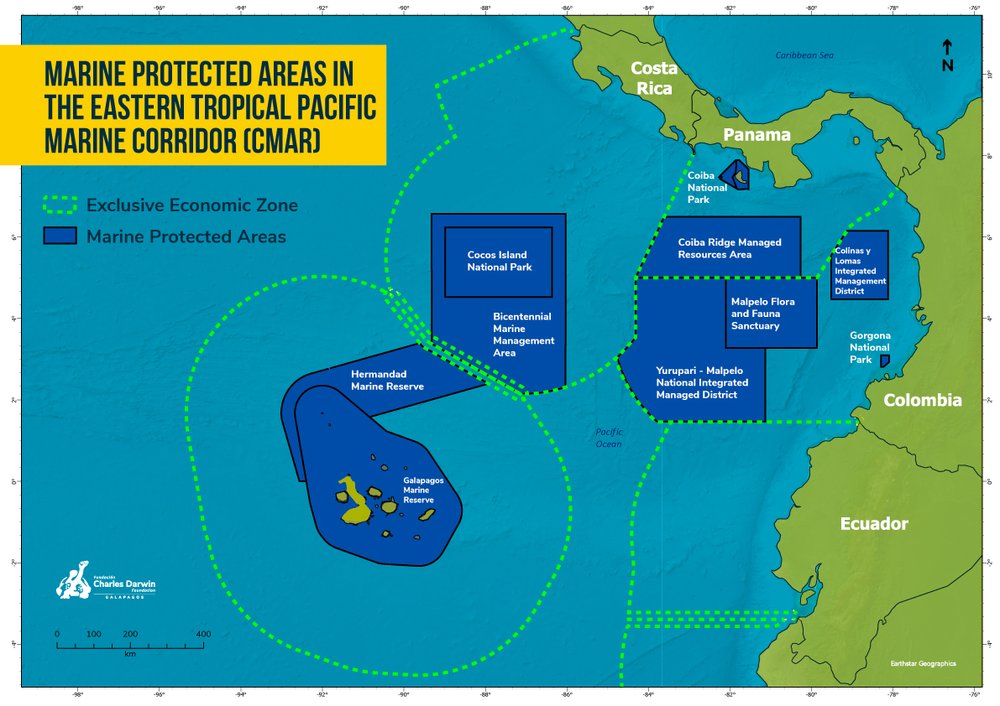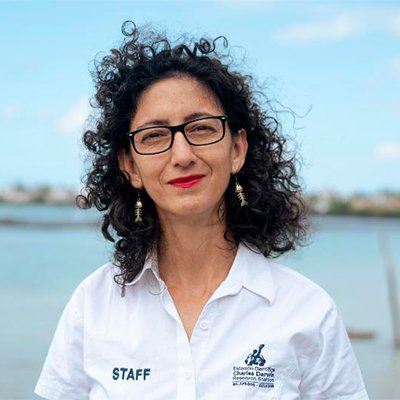Ecologically, the ocean is one interconnected system. Yet international law has divided it into arbitrary maritime zones based on geopolitical interests. Our research seeks to improve transnational ocean governance and conservation outcomes in the Eastern Tropical Pacific, through collaboration with scientists, academics, practitioners, and decision-makers.

Our team
María José Barragán Paladines
Science Director
Donors
Bezos Earth Fund
Gordon and Betty Moore Foundation
The Pew Charitable Trusts
About the Program
Our Ocean Governance program is an interdisciplinary research initiative that aims to evaluate and support the effective governance of Marine Protected Areas (MPAs) and the protection of marine biodiversity and ecosystem goods and services from a regulatory perspective, furthering conservation efforts and supporting the management of sustainable human activities. It is a transversal line of research which intersects with several other research programs at the Charles Darwin Foundation (CDF) to explore and help advance deep ocean protection, mitigation of marine invasive species and climate-related risk, and migratory species protection, in conjunction with sustainable development pathways that consider important local industries such as fisheries and tourism.
This program works closely with our Deep Sea Exploration Program.
Why it matters
While we recognize a single interconnected ocean from an ecological viewpoint, international law has divided the ocean into arbitrary maritime zones based on geopolitical interests. Adding to the complexity, each zone is regulated under a different regime and subject to different management standards. This mismatch between the legal framework for the ocean and its ecological reality has generated serious challenges from a governance perspective, resulting in significant regulatory gaps as well as negative outcomes for ocean health.
Elements of improved governance, such as cross-sectoral cooperation, coordination among stakeholders, and science-based decision making can be applied to enhance the existing legal framework. It has been argued that these less politicized forms of governance offer a more holistic way to address the transboundary challenges particular to the marine environment. However, the content and meaning of ‘governance’ is not clear-cut and the sub-field of ocean governance has become increasingly complex with a diverse array of laws, actors, and institutions involved. As such, ocean governance does not only refer to legal regulation but also includes customs, tradition, and culture, as well as institutions and processes with a variety of stakeholders involved, including governments, local communities, industries, and others.
Objectives of the program
This program aims to consolidate ocean governance as an established line of research at CDF, to support decision makers on a local, national and regional level in improving governability of marine ecosystems in the Eastern Tropical Pacific. To this end our researchers work in an interdisciplinary manner with scientists, academics, practitioners, and decision makers to advance our understanding of ocean governance and the increasing complexities involved in pursuing improved governance, transfer of knowledge and technical data to decision makers, and the translation of scientific findings into policy recommendations, with the overall goal of achieving better conservation outcomes for the ocean.
What we do
Ocean governance-related research focuses on MPA design, regulation, and management, including approaches to zoning and the potential impact of stressors such as climate change. The program is exploring pathways to a legally binding instrument for the Eastern Tropical Pacific Marine Corridor (CMAR), the relationship between the new international High Seas Treaty and regional ocean governance mechanisms, including its impact on the Eastern Tropical Pacific (ETP) region, and developing a global study of transboundary ocean governance mechanisms, incorporating both national and international waters.
Our Impact
Governance-related research activities are currently being carried out as part of our Deep Ocean Research program. Outputs include:
- A regional governance analysis with recommendations for national and regional management, legislation, and transboundary mechanisms relevant to the sustainable use and conservation of deep-water habitats and their linked ocean capital and services, covering the exclusive economic zones (EEZs) of Ecuador, Colombia, Panama, and Costa Rica, as well as their adjacent international waters.
- A review of the recently adopted High Seas Treaty to protect Biodiversity Beyond National Jurisdiction (BBNJ) and its impact on biodiversity goals for the ETP region.
- A series of ocean governance policy briefs for ETP decision makers.
- Support from the deep-ocean program to the CMAR Science working group to help advance shared 30x30 goals, Sustainable Development Goal (SDG) 14, and BBNJ, among others.

Bibliography
Enright, S. (fc. 2023) ‘Marine Protected Areas: Dynamism and Adaptability to Climate Change’ in R. Caddell & P. McCormack (Eds.) Research Handbook on Climate Change and Biodiversity Law (Edward Elgar Publishing)
Barragán-Paladines, M.J., M. Schoon, W. Collot d’Escury and R. Chuenpagdee (2023) ‘Managing fish or governing fisheries? An historical recount of Marine Resources Governance in the Context of Latin America – the Ecuadorian Case.’ In (Eds.) AK Hornidge and M Hadjimichael. Ocean Governance. Pasts, Presents, Futures. COST Action ‘Ocean Governance for Sustainability’
Enright, S. (2022), ‘Regional Cooperation for the Conservation of Marine Biodiversity in the Eastern Tropical Pacific: A Rule of Law Perspective’, In F. Platjouw & A. Pozdnakova (Eds.), The Environmental Rule of Law for Oceans: Designing Legal Solutions (pp. 283-298). Cambridge: Cambridge University Press. doi:10.1017/9781009253741.027
Enright, S., R. Meneses-Orellana, and I. Keith. (2021) "The Eastern Tropical Pacific Marine Corridor (CMAR): The Emergence of a Voluntary Regional Cooperation Mechanism for the Conservation and Sustainable Use of Marine Biodiversity Within a Fragmented Regional Ocean Governance Landscape." Frontiers in Marine Science 8: 569. https://doi.org/10.3389/fmars.2021.674825
Chuenpagdee, R.; R. De la Cruz-Modino; M.J. Barragán-Paladines; J.A. Glikman; J. Fraga; S. Jentoft; J. Pascual-Fernández (2020) ‘Governing from images: Marine protected areas as case illustrations’. Journal for Nature Conservation, 53, 125756. https://doi.org/10.1016/j.jnc.2019.125756
Enright, S. (2020) ‘Marine protected areas on the high seas: the role of regional ocean governance’ 25(6) Env. Liability 248-259.
Enright, S. and Boteler, B. ‘The Ecosystem Approach in International Marine Environmental Law and Governance’ in T O’Higgins, M Lago (Eds.) Ecosystem Based Management, Ecosystem Services and Aquatic Biodiversity, Theory, Tools and Applications (Springer 2020). https://doi.org/10.1007/978-3-030-45843-0_17
Barragán-Paladines, M.J. and R. Chuenpagdee (2017). ‘Step Zero in Galapagos Marine Reserve: how has pre-implementation influenced GMR present and future?’ Coastal Management, 45:5, 339-359. DOI:10.1080/08920753.2017.1345606.
Barragán, M.J. and R. Chuenpagdee (2015) ‘Governability Assessment of the Galapagos Marine Reserve’. Maritime Studies Journal, 14(1):13. DOI 10.1186/s40152-015-0031-z.

Protect Galapagos, Impact the World
The impact you make on this small ecosystem of enormous biodiversity is part of a larger footprint you are leaving for the world's future. Join us on our mission to safeguard one of our planet’s most important natural treasures through science and conservation action by making a donation today. Thank you for making an impact with us.





